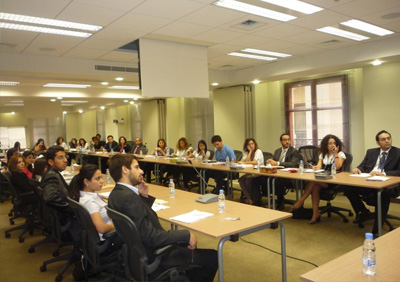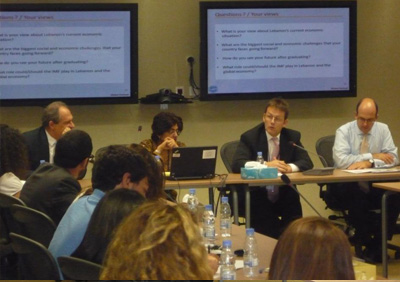Summary of Discussions Held with Lebanese Students on the Regional Economic Outlook
Beirut, October 26, 2010A group of 35 students from eight universities across Lebanon met in Beirut with an IMF team to discuss the economic outlook for the Middle East and North Africa region. The event, hosted by the IMF's Middle East Technical Assistance Center, forms part of the IMF's Middle East Dialogue launched earlier in the year.

In presenting the regional economic outlook, Ratna Sahay, Deputy Director in the Middle East and Central Asia Department was joined by Andreas Bauer (Mission Chief for Lebanon), Eric Mottu (Resident Representative), and Saade Chami (METAC Coordinator).
Ms. Sahay noted that, with the rebound in crude oil prices and oil production, the region’s oil-exporting countries will see a pickup in oil GDP growth and visible improvements in their fiscal and external balances in 2010–11. Growth in the non-oil sector will also increase, although more gradually, with somewhat sluggish private demand offset by supportive policies. Looking ahead, additional efforts at financial sector development and economic diversification top the agenda.
Turning to the region’s oil-importing countries (which include Afghanistan and Pakistan), Ms. Sahay said that they had weathered the global recession well, and that the global rebound is translating into higher growth in these economies: almost all of them are projected to grow faster in 2011 than in 2010. The only exceptions are Pakistan, where recent floods have disrupted the ongoing recovery, and Afghanistan and Lebanon, where growth remained strong in 2009–10 despite the global slowdown. The overriding longer-term challenges for this group of countries are to raise growth and provide jobs for expanding populations.

With regard to Lebanon, although the country had experienced impressive growth in recent years and throughout the financial crises, a number of policy priorities are needed to maintain this momentum, including the maintenance of political stability, a reduction in public debt, and pro-growth reforms.
The students—representing the Lebanese American University, University of Balamand, American University of Beirut, Saint Joseph University, Haigazian University, Notre Dame University, American University of Science and Technology, and the Holy Spirit University of Kaslik—raised a host of interesting issues related to the main economic challenges facing Lebanon, including governance issues, and political stability, and the role of the IMF.
A topic of special interest was Lebanon’s steady growth during the global financial crisis and its ability to weather the storm. One student remarked that this was due to Lebanon’s limited integration into international financial markets, which is not necessarily to the country’s advantage in the long run.
Another issue that generated lively discussion was governance. Many students expressed concern over wasteful government spending and enquired about the IMF’s advice to ensure spending efficiency. The IMF team pointed out that, by working on improving public financial management, the IMF is doing its share to enhance governance, without interfering in national policies.
The value-added-tax (VAT) also generated a great deal of debate, with some students disapproving of its regressive nature and arguing in favor of progressive taxation. On the issue of taxation and its relationship to social equity, the IMF team pointed out that most basic staples are exempt from the VAT, and that social equity could be achieved by targeting spending at the most vulnerable groups of the population.
The students expressed interest in engaging in similar discussions in the future, with particular emphasis on the implementation of IMF policy advice in Lebanon, the role of private-public partnerships in fostering private sector activity, and the role of households in generating savings and developing and sustaining a healthy banking sector.

